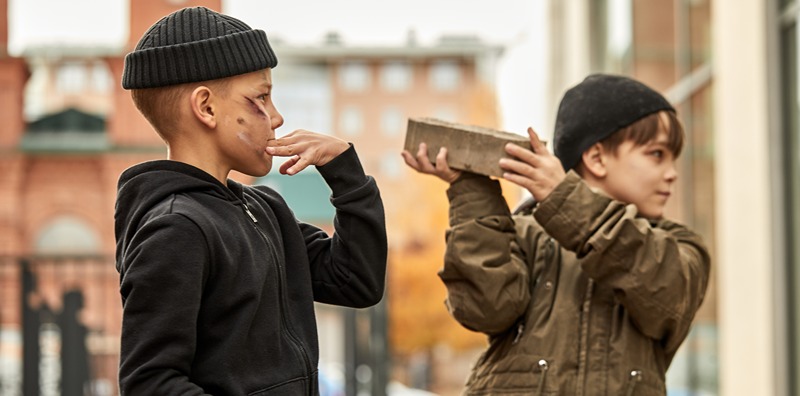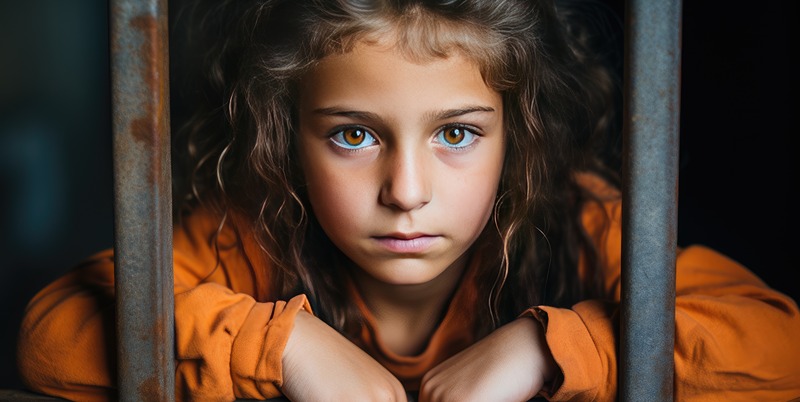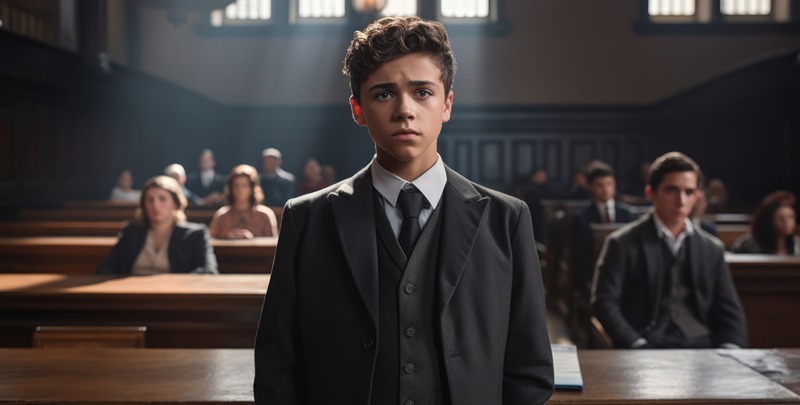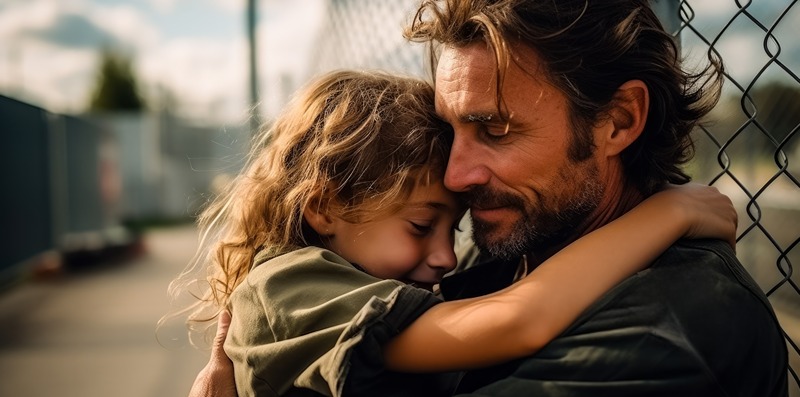Juvenile Crimes in Arizona: Punishments and Defenses

This article discusses the following:
Dealing with a juvenile offense can be a stressful and confusing time for teens and their families. Knowing the right steps to take isn't always clear, especially when someone as young as 14 years of age may be tried for their actions as an adult.
That's where getting the right criminal defense becomes crucial. At Kolsrud Law Offices, we understand these challenges and are here to help.
With our expertise in juvenile cases, we aim to provide clarity and support every step of the way. We believe everyone deserves a fair chance, and our team is dedicated to ensuring that young individuals get the guidance they need.
To make this journey less overwhelming, we offer a free consultation. Giving you an opportunity to discuss your situation with professionals who are ready to listen and help. With the right approach, a juvenile offense doesn't have to dictate your future, and at Kolsrud Law Offices, we're committed to providing the defense and support you need.
Contact us today to schedule a
FREE CONSULTATION and learn
how we can help you.
Your Rights During a Juvenile Arrest
Here are the key rights every juvenile should be aware of during an arrest:
- Right to Remain Silent: A juvenile has the right not to answer any questions asked by the police. This is to prevent self-incrimination, meaning they can't be forced to say anything that might suggest they committed a crime. It's often best to wait until a lawyer or guardian is present before speaking.
- Right to a Guardian or Attorney During Questioning: If a juvenile is going to be questioned by the police, they have the right to have a parent, guardian, or attorney with them. This ensures they have support and guidance during the questioning, helping avoid confusion or intimidation.
- Right to Consult with an Attorney: From the moment of the arrest, a juvenile has the right to talk to a lawyer. This is significant because a lawyer can offer advice, explain what's happening, and start working on a defense. The law requires the police to stop questioning once the juvenile requests an attorney.
These rights are there to protect juveniles during a vulnerable time. If these rights are not respected, it can affect the legal process later on. For example, if a juvenile is questioned without a guardian or attorney after asking for one, anything they say might not be allowed to be used against them in court.
It's important for both juveniles and their guardians to remember these rights and to feel confident in asserting them. If you're ever unsure, the best course of action is to stay quiet and ask for a lawyer.

What are Juvenile Crimes and Their Punishments
In Arizona, juvenile crimes are unlawful acts committed by individuals under the age of 18.
These offenses range from minor infractions to more serious felonies. The juvenile justice system in Arizona focuses more on rehabilitation than punishment, but the repercussions can still be significant and affect a juvenile's future.
Types of Juvenile Crimes
Juvenile crimes can be classified into several categories, each with its own set of legal implications:
- Status Offenses: These are actions that are considered violations only because of the juvenile's age. Examples include truancy (skipping school), curfew violations, and underage drinking.
- Property Crimes: These involve the theft or destruction of property and can range from vandalism or shoplifting to burglary or arson.
- Violent Crimes: These are offenses where the juvenile causes harm or threatens to harm others. Examples include assault, robbery, and, in more severe cases, homicide.
- Drug-Related Crimes: These involve the possession, use, or distribution of illegal substances.
- Sex-Related Crimes: These include offenses such as sexual assault or possession of child pornography.
Punishments for Juvenile Crimes
The juvenile justice system in Arizona aims to balance holding juveniles accountable for their actions while also providing them opportunities for rehabilitation. The punishments are generally less severe than those for adults and focus on correcting behavior.
Some of the common punishments include:
- Probation: Instead of being detained, the juvenile may be allowed to live at home under specific court-ordered conditions like regular check-ins with a probation officer, curfews, and attending school.
- Community Service: Juveniles may be required to complete a certain number of hours of service to the community, often in a way that is related to their offense.
- Fines or Restitution: Juveniles or their families may need to pay fines or restitution to the victims as a form of compensation for any loss or damage caused by the crime.
- Counseling or Treatment Programs: For issues related to substance abuse or mental health, the court may order the juvenile to undergo appropriate counseling or treatment programs.
- Detention: For more serious offenses, or if the juvenile is a repeat offender, the court may order detention in a juvenile facility. However, this is generally seen as a last resort, with the focus remaining on rehabilitation.
It's important to note that the specific punishment for a juvenile crime can vary widely based on factors such as the severity of the offense, the juvenile's age, their criminal history, and the circumstances surrounding the crime.

How Does Juvenile Court Work in Arizona
Arizona's juvenile court system is designed to primarily rehabilitate young offenders rather than merely punish them. This system operates under a different set of principles and procedures than the adult criminal justice system.
The Juvenile Court Process
The process typically involves the following steps:
- Intake: This is the first stage after a juvenile is arrested. A probation officer or prosecutor reviews the case and decides whether to dismiss it, handle it informally, or file formal charges. If the case is handled informally, the juvenile might have to meet certain conditions like attending counseling or performing community service.
- Detention Hearing: If the juvenile is held in custody, a detention hearing must be held quickly, usually within 24 hours. The judge decides whether the juvenile should remain in custody pending further proceedings. Factors like the nature of the offense, the juvenile's history, and community safety are considered.
- Adjudication Hearing: This is similar to a trial in adult court, but it is less formal, and there is no jury. The judge hears the evidence and decides if the juvenile committed the offense. Juveniles have the right to an attorney, the right to present evidence, and the right to confront and cross-examine witnesses.
- Disposition Hearing: If the juvenile is found responsible for the offense, a disposition hearing is held to determine the appropriate sentence. The court considers reports and recommendations from probation officers, the nature of the offense, and the juvenile's background. The focus is on rehabilitation, and the court may impose various sanctions including probation, community service, counseling, or placement in a juvenile detention facility.
- Review Hearings: The court may schedule review hearings to monitor the juvenile's progress. During these hearings, the court may modify the conditions of probation or other orders, depending on the juvenile's behavior and needs.
Special Considerations in Juvenile Court
- Confidentiality: Juvenile proceedings are generally more private than adult proceedings. The aim is to protect the juvenile's identity and to prevent the stigma that can accompany a public trial.
- Focus on Rehabilitation: The juvenile system is more flexible, allowing for a variety of rehabilitation programs tailored to the juvenile's needs. The objective is to prevent future offenses by addressing the underlying issues that led to the juvenile's involvement in the justice system.
- Parental Involvement: Arizona law emphasizes the role of parents or guardians in the process. They are expected to be involved at every stage and may also be required to participate in counseling or treatment programs.

When Can Juveniles Be Tried as Adults
In Arizona, a juvenile can be tried as an adult under specific circumstances, primarily determined by the juvenile's age, the offense's severity, and the juvenile's previous record. The decision to move a juvenile case to the adult criminal system is a serious one, and it's made through certain legal processes.
Here's an overview of when and how this can happen:
When Can a Juvenile Be Tried as an Adult?
- Age of the Juvenile: Generally, juveniles aged 15, 16, or 17 can be tried as adults for more serious offenses. For the most severe crimes, juveniles as young as 14 can be tried as adults.
- Severity of the Offense: Serious offenses, particularly those involving violence or significant harm to others, are more likely to lead to a juvenile being tried as an adult. This includes crimes like homicide, aggravated assault, sexual offenses, and certain drug crimes.
- Juvenile's Criminal History: A juvenile with a history of delinquency or previous offenses, especially if prior rehabilitation efforts have not been successful, may be more likely to be tried as an adult.
How Can a Juvenile Be Tried as an Adult?
There are three primary ways a juvenile case can be moved to adult court in Arizona:
- Statutory Exclusion: For certain serious offenses, the law mandates that the case be filed directly in adult court. The juvenile court does not have jurisdiction over these cases, and the decision does not involve prosecutorial discretion or a judicial hearing.
- Direct File (Prosecutorial Discretion): The prosecutor has the authority to file charges against the juvenile directly in adult court for certain offenses. This decision is at the prosecutor's discretion and is typically based on the severity of the offense, the circumstances surrounding the crime, and the juvenile's past behavior.
- Judicial Waiver: The juvenile court may hold a waiver hearing to determine whether the case should be transferred to adult court. The judge considers various factors, including the juvenile's age, the seriousness of the offense, the juvenile's maturity and mental state, the potential for rehabilitation within the juvenile system, and public safety concerns.
When a juvenile is tried as an adult, they face the same legal procedures and potential sentences as adults, including longer prison terms and permanent criminal records.
What are Defenses for Juvenile Crimes
A well-crafted defense strategy can significantly impact the outcome of a juvenile's case, potentially leading to reduced charges, diversion to rehabilitation programs, or even case dismissal.
Here are common defenses for juvenile crimes:
Lack of Intent
Many crimes require a specific intent to commit the offense. If the defense can demonstrate that the juvenile did not have the intention to commit the crime or was not aware that their actions would lead to a crime, this can be a strong defense.
Mistake of Fact
This defense is applicable if the juvenile genuinely misunderstood or was mistaken about a fact and, as a result, did not believe they were committing a crime. For example, if a juvenile accidentally took someone else's property thinking it was theirs, they may use this defense.
Influence of Peers or Adults
Juveniles are more susceptible to peer pressure or the influence of adults. If it can be shown that the juvenile committed the crime under the coercion or significant influence of others, this can mitigate the charges or lead to alternative sentencing options.
Insufficient Evidence
As in adult cases, the prosecution must prove every element of the offense beyond a reasonable doubt. If the defense can demonstrate weaknesses, inconsistencies, or gaps in the evidence, the charges may be reduced or dismissed.
Violation of Rights
If the juvenile's rights were violated during the investigation or arrest—such as not being read their Miranda rights, not having access to a guardian or attorney during questioning, or being subjected to an unlawful search or seizure—the evidence obtained can be suppressed.
Mental Health or Capacity Issues
If a juvenile suffers from mental health issues or lacks the capacity to understand the nature of their actions fully, this can be used in their defense. The court might order psychological evaluations, and the findings can influence the court's decision, potentially leading to treatment rather than detention.
Self-Defense or Defense of Others
If the juvenile committed the alleged crime to protect themselves or someone else from imminent harm, and there was no reasonable opportunity to escape or seek help, this defense might be applicable.
It's important to note that the effectiveness of these defenses varies based on the specifics of each case, the juvenile's history, and the circumstances surrounding the alleged crime.

The Role of Parents or Guardians in Juvenile Cases
In juvenile cases, the involvement of parents or guardians is crucial. They are not just a source of emotional support for the young person facing legal challenges but also play a key role in the legal process itself.
Here’s an overview of their responsibilities:
- Offering Support: Parents or guardians provide the much-needed emotional backing to the juvenile, helping them deal with the stress of the legal situation.
- Active Involvement in Legal Matters: They must be present during court sessions and meetings with lawyers, ensuring the juvenile has the necessary support.
- Speaking for the Juvenile’s Interests: Parents can give the court a clearer picture of the juvenile’s life and needs, advocating for decisions that are in the best interest of the juvenile's future.
- Ensuring Rules are Followed: If the court sets certain rules like curfews or school attendance, it’s up to the parents or guardians to make sure these are followed.
- Participating in Programs: Sometimes, the court might ask parents or guardians to join in counseling or other programs. This not only supports the juvenile but can also improve family relationships.
- Preparing for the Future: Parents or guardians are key in creating a stable and supportive environment at home, helping the juvenile reintegrate into the community positively after any court-imposed programs.
In short, parents or guardians are essential in guiding the juvenile through the legal process and beyond, ensuring they have the support and structure needed for a better path forward.
How a Juvenile Defense Attorney Can Help
At Kolsrud Law Offices, we understand how stressful and confusing it can be when a young person faces legal trouble. That's where a juvenile defense attorney comes in, providing much-needed help and guidance. Here's what an attorney can do for you:
First, they bring their knowledge of the law to your case, making sure you understand what's happening and what your options are. They look at the details of your case carefully, then come up with a plan to defend you in the best way possible. Sometimes, this means talking to the prosecutor to see if they can reduce the charges or even handle the situation without going to court, focusing on solutions that help you learn and grow from the experience.
If your case does go to court, your attorney will be right there with you, presenting your side of the story, showing evidence in your favor, and working hard to get the best outcome. But their job isn't just about arguing in court. They're also there to support you and your family through this tough time, explaining each step of the process and helping you deal with the stress and worry.
Even after your case is over, your attorney might still be able to help, like assisting with probation requirements or working to clear your record, so your future isn't held back by a mistake.
At Kolsrud Law Offices, everyone, especially young people, deserves a second chance. We're committed to not just defending you in court, but also supporting you and your family every step of the way, aiming for a future where you can move past this and reach your full potential.
If you or a loved one is facing legal challenges, don't hesitate to reach out. You can contact us for a free initial consultation to discuss your case and explore your options. Give us a call at 602) 638-3790.
An award-winning criminal defense attorney Since 2006
Why Choose Josh Kolsrud
With over 100 jury trials to his name, and years of experience as a state and federal prosecutor, Josh understands the law, the legal process, and your rights. Josh is also committed to representing every client with utmost integrity and dedication
Experience
Josh has prosecuted major crimes on the state and federal level, led a successful anti-human sex trafficking operation that saved lives, and argued before countless juries and justices for his clients
Expertise
Josh is an expert in both Arizona and federal criminal law, and is ready to put that expertise to work for you.
Dedication
As a prosecutor, Josh saw far too many defendants lose their livelihood due to poor representation. Josh will always give every client his complete attention and effort
Get a Free Initial Consultation:
Complete our form below to get a free case review.
or call us at (480) 999-9444.
